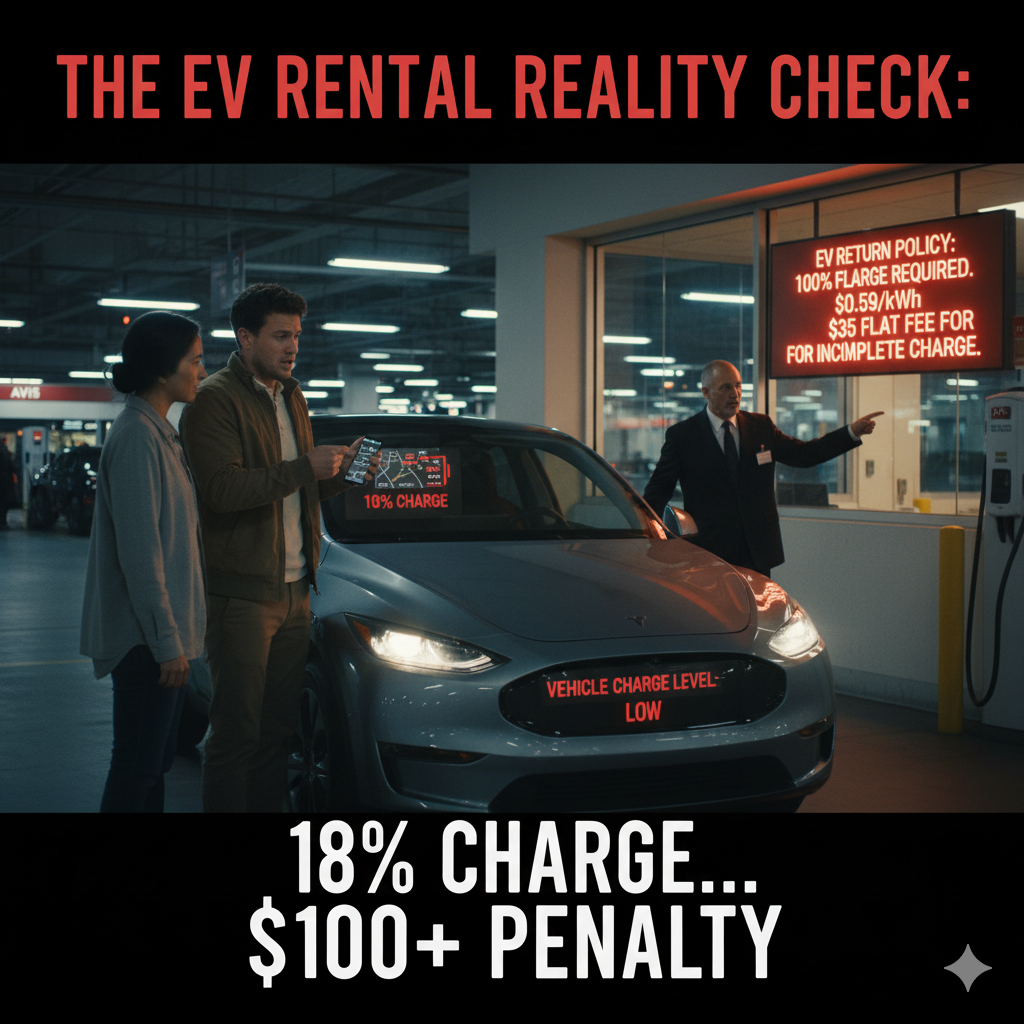
I recently rented an Avis Electric Vehicle (EV). Their return procedures were more complicated than I thought. The car was charged to 94%. The rental agencies said that I needed to return it at the same level (plus or minus 5%). If the car was below the return level (89%) then I would be charged $35 and if it were below 75% then I would be charged $70. Now that is a big fee!!
Of course, I decided to return it to the level I rented it at. As a result, I had to jump through some hurdles to get it to that level as I prepared for my flight home. When I got home, I decided to check Avis’ website to see how they arrived at this pricing structure.
Avis’s EV Return Policy and Fees
Avis’s policy clearly states that the EV must be returned with a battery charge level of at least 70%. If a renter fails to meet this requirement, they face the following tiered penalties, which are added to the final bill:
| Battery Charge Level on Return | Fee Assessed | Total Charging Fee |
| 70% or Higher | $0 | $0 |
| Less than 70% but More than 10% | $35 Charging Fee | $35 |
| Less than 10% | $35 Charging Fee + $35 Low Charge Fee | $70 |
Avis justifies these fees by noting they cover the kilowatt hours, overhead, loss of use of the EV, and administrative costs Avis incurs in charging the vehicle. I feel this pricing structure is overinflated.
My problem arises that I was informed of a different return pricing structure by the local Avis staff. From their presentation, it was much more punitive than Avis’ official policy as stated on their website (which I think is much more costly than it should be). From my experience with the local Avis shop in California, I am reluctant to rent an EV again. I do not know what real story would be if I rent another one.
In addition to the return fee question, I am concerned with refueling my EV. Gas cars only take a few minutes to fill up but charging an EV requires more time and planning. For travelers rushing to catch a flight, the 30–60 minutes needed for a public charging session to hit the 70% mark can be the deciding factor, often leading them to accept the $35 fee out of necessity (which I hope is the applicable fee).
Is there a better way for rental car companies to deal with returning vehicles. For rental companies to truly facilitate renting EV’s, their charging policies need to prioritize transparency and fairness over punitive measures:
- Fixed Fee vs. Cost-Per-Mile: Some competitors offer options that allow the renter to purchase pre-paid charging or return the vehicle at a flat, reasonable rate, making costs predictable.
- On-Site Fast Charging: The best solution is for rental locations to offer their own on-site fast-charging stations (like Tesla Superchargers for Tesla rentals) that are easily accessible to departing customers, allowing them to top off to 70% without navigating public networks.
- Clear, Upfront Communication: While the policy is disclosed, counter staff should clearly demonstrate the 70% return rule at check-out, ensuring it is a conscious decision, not a surprise charge. They should avoid making up their own rules.
The challenge we have in the EV rental market is the renter’s comfort zone with EV’s both in charging as you drive and returning it. Let alone, range anxiety which is the biggest hurdle for adoption. On the car rental side, the complexity and punitive nature of the rules causes misunderstanding with both rental agencies and customers. If they could address these issues, I would expect a growth in the EV rental market.
